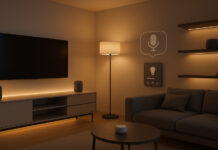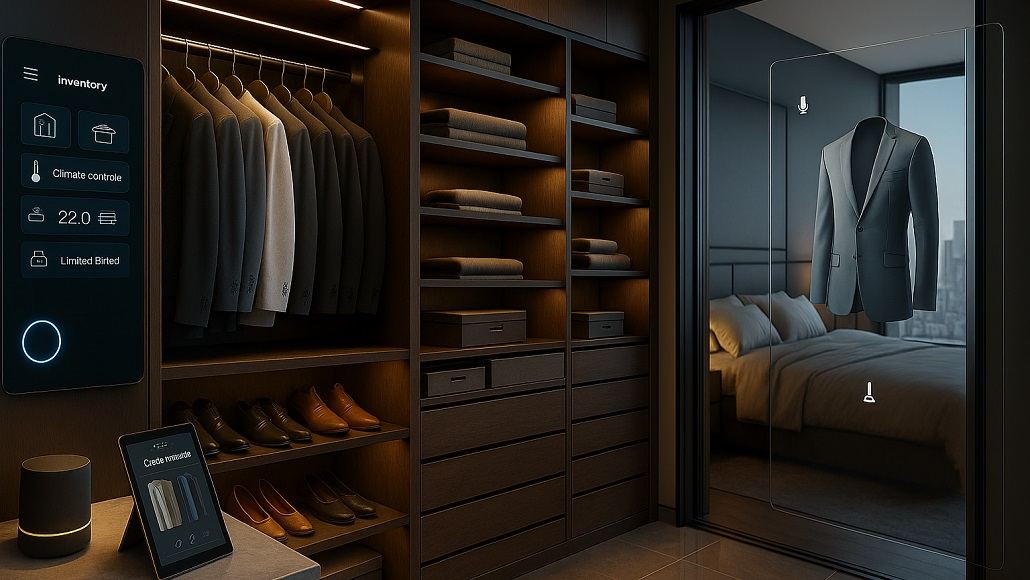Intelligent closets and furnishings are transforming the very definition of luxury and personalisation as the interior design and home furnishings industries undergo a dramatic upheaval. Automated wardrobe systems are changing the game thanks to technical advancements and rising customer demand for customised solutions. These technologies, which offer sophisticated inventory management, climate control, and custom finish options, are revolutionising the business. This essay examines the revolutionary developments in intelligent closets, emphasises how crucial it is to scale personalisation, and looks at how these state-of-the-art developments align with local fashion trends.
The Rise of Intelligent Closets
Smart closets are not simply fashionable storage; they are a fusion of technology, design, and functionality that provides a fluid user experience. The incorporation of smart technology within closet systems is revolutionizing our strategy towards organization and personal style. Statista reported that the global market for smart homes will be valued at $174 billion in 2025, with smart furnishings likely to contribute in a major way.
One of the most enticing aspects of smart closets is inventory tracking. Such systems make use of RFID technology or mobile apps to track clothing and accessories, making it easy for users to organize their wardrobes. Just think about being able to list out your whole wardrobe, being alerted to pieces you haven’t worn in months, or even receiving outfit suggestions based on the weather or events. This degree of organization not only saves time but also refines the way that people go about their personal style.
In addition, automated wardrobe solutions tend to be equipped with climate control functionality, which helps preserve garments under ideal conditions. This is especially crucial for exclusive materials and fabrics that need precise humidity and temperature settings in order to prevent degradation. With the integration of climate control, smart closets can prolong the durability of high-end pieces while also giving homeowners a sense of security.
Personalization at Scale
Personalization is becoming all the more vital in the present consumer marketplace. Smart closets and furniture are created to suit individual tastes, making it possible for users to personalize their environments to fit their specific styles and requirements. Having the option to select custom finishes, colors, and configurations takes the phenomenon of personalization to new dimensions.
Luxury appeal is a primary motivating force behind the popularity of smart closets. Buyers are more likely to spend money on high-quality, bespoke solutions that beautify their homes. As per a national survey by the National Kitchen & Bath Association, almost 75% of homeowners seek personalization in home renovation, reflecting a strong trend towards customization in home decor.
Furthermore, smart closets can be designed to suit local fashions and cultural trends. For example, in regions such as Asia, where fashion trends and preferences may differ considerably, customizable features make it easy for consumers to personalize wardrobe systems in accordance with their cultural identities. Localizing design not only makes intelligent closets and furnishings more attractive but also gives consumers a sense of uniqueness that can be shared with different consumer groups.
Innovative Features and Technologies
The smart closets of the present era come preloaded with a host of innovative aspects that both augment functionality and luxury. Intelligent mirrors with built-in LED lights enable customers to virtually try on clothing, creating a futuristic fitting room experience in the comfort of their own homes. The mirrors can also be connected to mobile apps to provide recommendations for complementary outfits or monitor wearable accessories in real-time.
Moreover, voice-controlled assistants are also becoming more prevalent in smart closet systems. This permits individuals to order their wardrobe to arrange clothes, provide outfit recommendations, or even book cleaning appointments for particular garments. The smooth integration of technology and personal space is evidence of a shift towards smarter living solutions.
Another advanced technology is augmented reality (AR) in intelligent closet design. With AR apps, customers can see how various configurations, finishes, and amenities will appear in their homes prior to purchase. This immersive experience not only maximizes decision-making but also empowers customers to design spaces tailored to their own preferences.
The Future of Intelligent Closets
Looking ahead, there will be an increased need for intelligent closets and furnishings as technology continues to advance, and individuals desire more personalization. The market for home solutions will continue to expand at a rapid pace, with customers looking for combined systems that provide luxury, convenience, and functionality.
Designers and manufacturers need to be responsive to changing consumer desires, so that smart closets are not only provided with the newest technology but also the sustainability factor. Eco-friendly technology and energy-saving machinery will appeal to concerned consumers who want to reduce their footprint on the earth.
Furthermore, with urban residential spaces becoming smaller, there will be an increased demand for multifunctional and smart storage. Smart closets that optimize space with customized features will be in demand to accommodate the changing lifestyles of today’s homeowners.
Conclusion
In summary, intelligent closets and furnishings personalization at scale is a revolutionary change in home design. With technology advancements making features such as tracking inventory, climate control, and custom finishes possible, such systems are redefining convenience and luxury in personalized spaces.
As consumer demand for bespoke solutions keeps increasing, companies need to evolve to remain competitive. Through the adoption of innovation and the focus on customization, manufacturers are able to meet diverse consumer needs while responding to regional fashion trends. By focusing on sustainability as well as multifunctionality, the future of smart closets is promising with potential to revolutionize the way people live in their homes and define their personal style.































